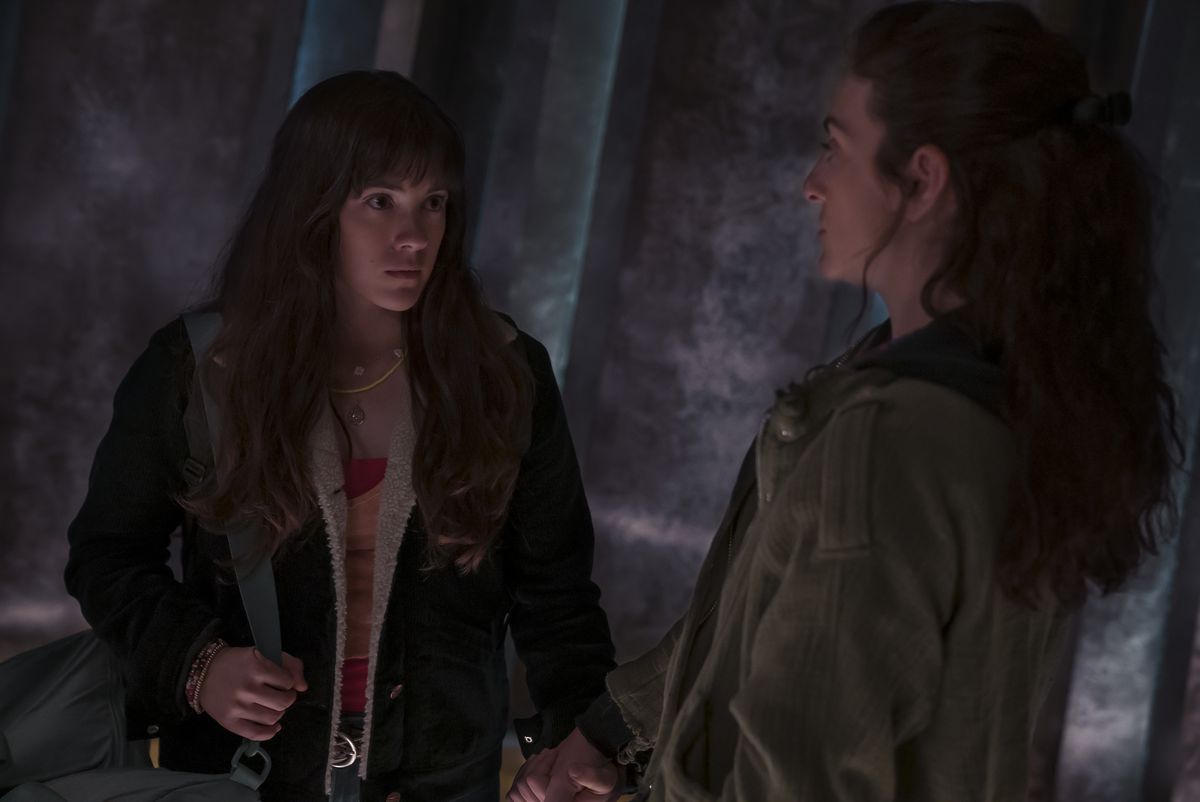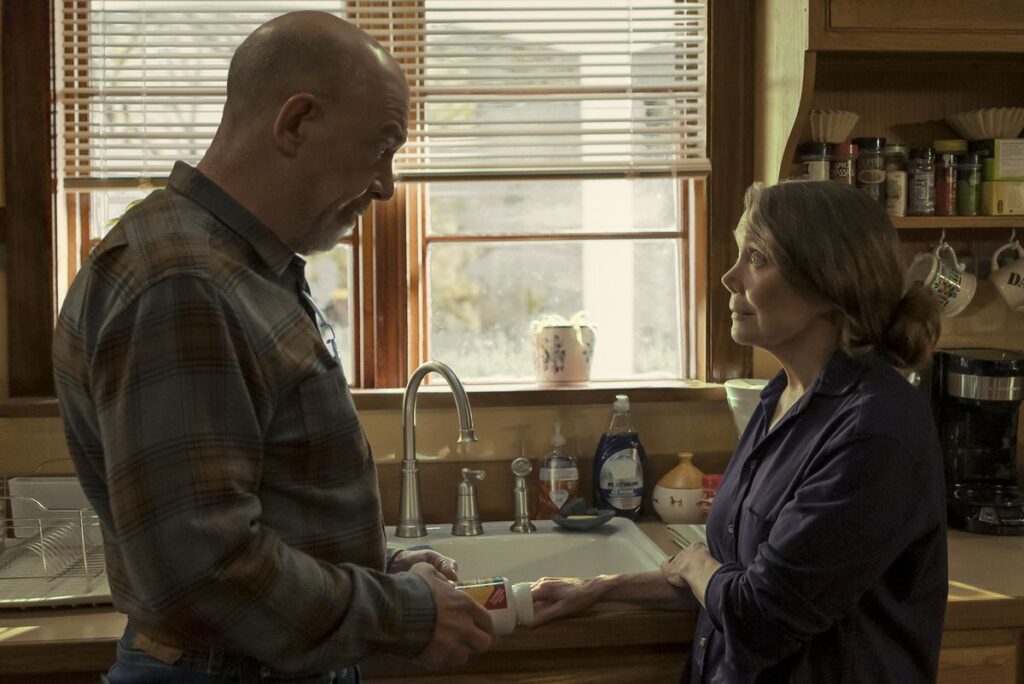Are we in a golden age of post-Lost puzzle-box shows? Spoiler alert: No, certainly not, and the proof is Lost still being the standard reference point for elaborate, weird-fiction soap operas nearly two decades after its debut. But we’re closer than ever to a puzzle-box bubble, with multiple sci-fi soap operas appearing ready to survive outside the first-season incubator.
On Showtime, the dull girls are being literally ripped to shreds following a spooky plane crash in Yellowjackets. NBC’s goofy time-travel adventure La Brea became an instant ratings hit not long after Manifest, its prior goofy time-travel adventure, was canceled only to be resurrected by Netflix following a rabid fan response. Factor in Prime Video’s metaphysical cowboy drama, Outer Range, and it’s hard not to conclude that temporal maws are sooo hot right now. Coming just on the heels of Outer Range — arguably too close for comfort — is Prime Video’s Night Sky, which is more charming and versatile than its peers, but is ever threatening to topple over thanks to its chaotic pacing and strenuous world-building.
Co-headliners Sissy Spacek and J.K. Simmons star as Irene and Franklin York, a lovely couple living out their twilight years in fictional small-town Indiana. The Yorks have built an effortless intimacy, which at first suggests they’re merely reaping the benefits of over a half-century of partnership. Frank still tinkers with carpentry projects after a woodworking career as long as his marriage, but his biggest responsibility now is Irene, whose declining health may soon extend past Frank’s capacity as a caretaker. But as it turns out, their close bond is based just as much on a clandestine ritual as their love for each other.
In the Yorks’ backyard shed, a hidden staircase leads to an ancient portal, a raw metal chamber with pulsating innards and a door that evokes primitive H.R. Giger. When Irene and Frank step inside the chamber, they’re instantly transported to a cozy observation deck with a panoramic window onto a gorgeous, if desolate, alien landscape. The view is stunning — all sparkly meteor showers against blue-violet hues and chalky rocks as far as the eye can see. They’ve been coming for years to take in the majesty of it all while pondering the existential ramifications of extraterrestrial life. But when we meet the Yorks, the portal that once bonded them so intensely is beginning to drive a wedge in their unbreakable union.
Photo: Chuck Hodes/Prime Video

Photo: Chuck Hodes/Amazon Prime Video
After hundreds of trips to their Aerospace-bnb, Franklin regards their entryway to a far-flung planet as little more than a timeshare beyond its novelty, especially as he can’t determine whether the trips are exacerbating Irene’s ailments. But for Irene, the portal has taken on an appropriately outsize role in her identity as an individual and as half of a partnership. “There’s a reason we were the ones that found this,” Irene tells her husband after he suggests less frequent wormhole surfing. “This is our riddle to solve.” That riddle only grows more intense and more dangerous with the arrival of a mysterious drifter named Jude (Chai Hansen) who clearly has the answers the Yorks crave most, but considering the traumatized condition Irene finds him in, he has to prioritize recovery over exposition.
The pilot ranks among the best of its genre based solely on the strength of the lead performances. Spacek and Simmons make for such a phenomenal, synergistic pair, it’s hard to imagine anyone else playing either character. (That includes the estimable Ed O’Neill, who was set to play Franklin before withdrawing for personal reasons.) The script from creator Holden Miller is beautifully composed and well observed. Granted, none of it is particularly groundbreaking. The show sounds like Cocoon-meets-Stranger Things because that’s precisely what it is, a fun and assured riff on Spielbergian first-contact adventures. Spirituality plays a vital role, as is the case with any show about characters trying to process realities beyond their understanding, but Night Sky is refreshingly playful about its heaviest themes. In the able hands of director Juan José Campanella, the pilot plays like the first half of a solid genre-lite feature film.
Alas, Night Sky is a television show with eight episodes, and Miller and showrunner Daniel C. Connolly seem determined to cram them to the rafters full of storylines and breadcrumb trails. As the Yorks are helping their unexpected guest acclimate to his new surroundings, the audience is also left adjusting to an abrupt shift from Indiana all the way to a secluded llama farm in Argentina. Stella (Julieta Zylberberg) and her teenage daughter, Toni (Rocío Hernández), are also a tipping point in their relationship. Toni’s in high school now, at that age where a young, modern woman gets weary of shearing wool and guarding access to the family’s ancient (and reportedly haunted) chapel. When a menacing visitor from Stella’s past shows up demanding she undertake a dangerous mission, she’s forced to choose between following her destiny and maintaining the bubble of blissful ignorance she’s built around Toni.

Photo: Chuck Hodes/Amazon Prime Video
To its credit, Sky wastes no time tying together the two disparate stories and tipping its hand earlier to how the two will converge. But the two plots bump awkwardly against each other in the meantime, and Sky often feels like two shows in competition with each other. Because while Simmons and Spacek are the main talent draw, Zylberberg and Hernández are also terrific, and their characters’ relationship is equally rich and nuanced. Although the Yorks are the center of gravity, it’s easy to forget all about them when Stella and Toni are foregrounded, and the reverse is equally true. Both narrative planets have a uniquely gorgeous view and atmosphere, but the audience can’t keep one foot between the two any more than the characters can.
Both main storylines pile on frantic side plots and grating side characters. As Frank and Irene work to solve their Jude problem, they have to tiptoe around their collegiate granddaughter (Kiah McKirnan) as well as a meddling neighbor (Adam Bartley), who acts like he’s on loan from a CBS sitcom. Meanwhile, Stella and Toni embark on a consequential road trip that unearths secrets about Stella’s past and Toni’s future. The writers are meticulous about each plot thread, almost to a fault, as fuses are lit and extinguished within an episode or two. But the relentless pace occasionally stops feeling less like storytelling and more like the mirthless completion of a checklist.
When all the characters and plot points finally collide in the finale, the climax underwhelms, working harder to shore up future plots than delivering on the current ones. There’s a whiff of desperation to the hyperspeed plotting — perhaps because the nuts and bolts of the world are so familiar. Behind all the cloak and dagger is the same old, same old: glowing baubles and alien bric-a-brac that inevitably fall into the wrong hands at inopportune moments. It’s almost as if in the absence of new ideas, Night Sky wants to be a Las Vegas-style mega-buffet of sci-fi tropes in the hope the abundant quantity will compensate for the lack of originality. The performances alone make Sky a journey worth taking, but be careful with the remote. To accidentally skip an episode is to think a portal has spirited you away to the back half of Night Sky season 3.

